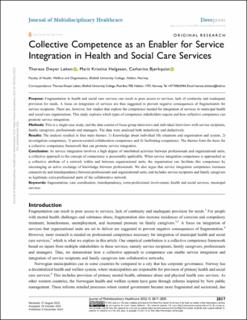| dc.contributor.author | Løken, Therese Dwyer | |
| dc.contributor.author | Helgesen, Marit Kristine | |
| dc.contributor.author | Bjørkquist, Catharina | |
| dc.date.accessioned | 2022-12-14T19:12:41Z | |
| dc.date.available | 2022-12-14T19:12:41Z | |
| dc.date.created | 2022-12-12T08:46:10Z | |
| dc.date.issued | 2022 | |
| dc.identifier.citation | Journal of Multidisciplinary Healthcare. 2022, 15, 2817-2830. | en_US |
| dc.identifier.issn | 1178-2390 | |
| dc.identifier.uri | https://hdl.handle.net/11250/3037801 | |
| dc.description.abstract | Purpose: Fragmentation in health and social care services can result in poor access to services, lack of continuity and inadequate provision for needs. A focus on integration of services are thus suggested to prevent negative consequences of fragmentation for service recipients. There are, however, few studies that explore the competence needed for integration of services in municipal health and social care organizations. This study explores which types of competence stakeholders require and how collective competence can promote service integration.
Methods: This is a single-case study, and the data consist of focus group interviews and individual interviews with service recipients, family caregivers, professionals and managers. The data were analysed both inductively and deductively.
Results: The analysis resulted in four main themes: 1) Knowledge about individual life situations and organization and system, 2) investigation competence, 3) person-centred collaboration competence and 4) facilitating competence. The themes form the basis for a collective competence framework that can promote service integration.
Conclusion: As service integration involves a high degree of interlinked activities between professionals and organizational units, a collective approach to the concept of competence is presumably applicable. When service integration competence is approached as a collective attribute of a network within and between organizational units, the organization can facilitate this competence by encouraging an active exchange of knowledge between professionals. We also argue that service integration competence increases connectivity and interdependency between professionals and organizational units, and includes service recipients and family caregivers as legitimate extra-professional parts of the collaborative network. | en_US |
| dc.language.iso | eng | en_US |
| dc.publisher | Dove Medical Press Ltd. | en_US |
| dc.rights | Navngivelse-Ikkekommersiell 4.0 Internasjonal | * |
| dc.rights.uri | http://creativecommons.org/licenses/by-nc/4.0/deed.no | * |
| dc.subject | fragmentation | en_US |
| dc.subject | care coordination | en_US |
| dc.subject | interdependency | en_US |
| dc.subject | extra-professional involvement | en_US |
| dc.subject | health and social services | en_US |
| dc.subject | municipal services | en_US |
| dc.title | Collective Competence as an Enabler for Service Integration in Health and Social Care Services | en_US |
| dc.type | Peer reviewed | en_US |
| dc.type | Journal article | en_US |
| dc.description.version | publishedVersion | en_US |
| dc.rights.holder | © 2022 Løken et al. | en_US |
| dc.subject.nsi | VDP::Medisinske Fag: 700::Helsefag: 800 | en_US |
| dc.source.pagenumber | 2817-2830 | en_US |
| dc.source.volume | 15 | en_US |
| dc.source.journal | Journal of Multidisciplinary Healthcare | en_US |
| dc.identifier.doi | https://doi.org/10.2147/JMDH.S387719 | |
| dc.identifier.cristin | 2091694 | |
| cristin.ispublished | true | |
| cristin.fulltext | original | |
| cristin.qualitycode | 1 | |

